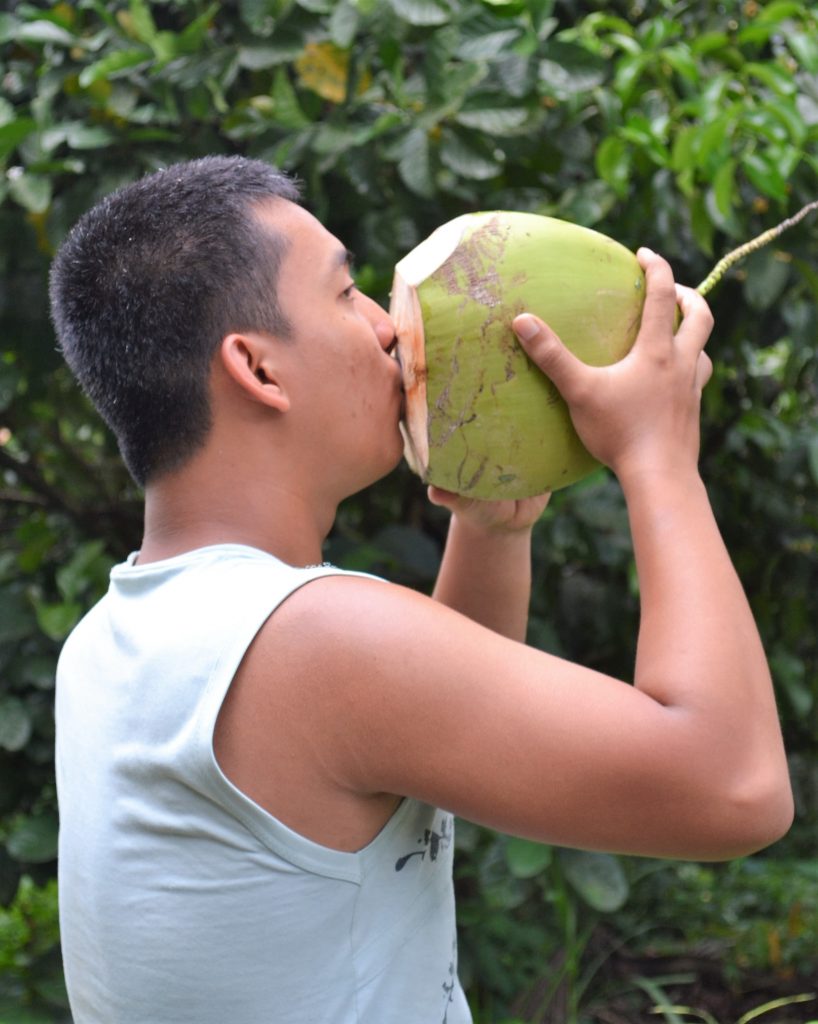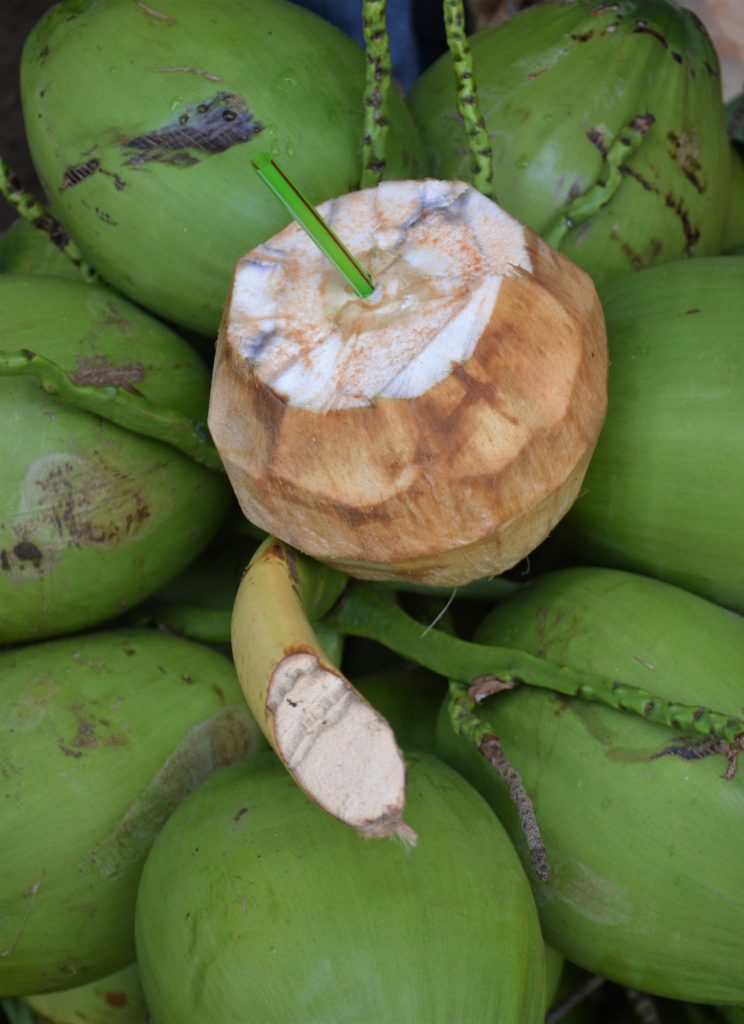Reynaldo Hiligan, in his social media account, begged President Rodrigo R. Duterte about the situation of the price of copra. “Our beloved president. We hope you give coconut farmers some justice regarding the price of copra. It’s only P2.30 for the whole price of a coconut.”
A teacher from Davao shared the post and commented: “The price of copra is very cheap but the coconut oil is expensive. What is the Department of Agriculture doing? When will it be able to help the thousands of coconut farmers in the Philippines?”
The Philippine Coconut Authority (PCA), the government’s agency tasked for the coconut industry, wrote in its website: “The fluctuation of domestic copra market is cyclical and this is beyond the control of the PCA or any government agency. This is because the domestic copra price is dependent to the coconut oil price in the global market.
“The global coconut oil price, on the other hand, is determined or affected by the supply and demand situation of other vegetable oils (that is, oil palm, soybean, rapeseed, sunflower, olive oil, etc.) in the international market,” PCA continued. “Though the Philippines is the biggest exporter of coconut oil in the world, coconut oil is just one of the many vegetable oils produced globally. As such, its price is greatly affected by the movement of prices of other vegetable oils particularly the palm oil which is the biggest among the internationally-traded vegetable oils (35%) and soybean oil, the second biggest vegetable oil (29%).”

Since December 2017, the price of palm oil in the world market has been going down. This explains the very low price of copra as companies in the international market using vegetable oils buy more palm oil as the supply is high and the price is low. “But if the supply of palm oil goes down,” PCA said, “prices of vegetable oils (including coconut) will again go up.”
Though copra price fluctuation is beyond the control of the government, it is very much aware of its impact to the coconut farmers. This is the reason why the Department of Agriculture has been trying to find some possible solution to the problem. One of these is finding other products from coconut that can exported to other countries.
Coconut water – also known as buko juice or coco water – as one of the products that has high potential abroad. It must be recalled that during the presidency of Benigno Aquino III, he hailed coco water as one of the country’s most promising new export opportunities.
“Drinking what they call coco water, and what we call buko juice, is a growing trend in the US,” Aquino told the press when he returned from a working visit to the United States. “Because of its nutrients, because it is natural and environment friendly, it is becoming the new natural sports drink in America and is now a hundred-million-dollar industry.”
During the Palarong Pambansa held in Davao City recently, Agriculture Secretary Emmanuel Piñol launched buko juice as “the official energy drink” of the athletes coming from all over the country.
“Coconut water is considered a sports drink because it contains many nutrients lost in physical exertion and sweating,” Susan Ferrandino points out in an article published in Livestrong.com. “It is marketed as an isotonic beverage, which means that concentration levels of nutrients are the same as in human blood. As a result, coconut water is absorbed readily into the body and can prevent dehydration after a workout.”
That’s going ahead of the story, however. Let’s take a closer look at it. “One cup of coconut water contains 46 calories,” writes Rebecca Slayton for Livestong.com. “Carbohydrates make up the majority of the calorie content, with 8.9 grams per one-cup serving, of which 6.26 grams are from sugar.”
Coconut water is a good source of the electrolyte potassium, and provides 600 milligrams per one-cup serving. This is the reason why it’s good for those engaged in sports to drink coconut water. “Normal potassium levels are necessary for regular cell function,” Slayton writes. “When potassium levels drop too low, it affects your nervous system and can lead to an irregular heartbeat, which can be fatal.”
But it’s not only because of potassium why it’s a good sports drink. “Coconut water also contains 252 milligrams per serving of sodium, which is another electrolyte lost during exercise through sweat,” Slayton claims. “Sodium plays a role in your critical body functions by regulating the movement of water in and out of your cells.”

Coconut water is indeed a perfect sports drink. “The potassium and sodium content found in coconut water make it a smart choice when you become dehydrated, whether from physical activity or sickness when you are experiencing diarrhea or vomiting.”
But that’s not all. “Coconut water offers a good source of vitamins making it a nutritious drink option,” Slayton writes. “One serving of coconut water provides 5.8 milligrams of vitamin C, along with folate, riboflavin, thiamin, niacin and vitamin B6. Coconut water also provides other key minerals including calcium, iron, magnesium, phosphorus and zinc.”
Despite the marketing hype, coconut water does have a few medical uses. For those with hypertension, it can be drunk to lower blood pressure. A study reported by The West Indian Medical Journal said coconut water was able to lower the systolic pressure by 71% and diastolic pressure by 29%.
While coconut water may support healthy blood pressure levels, it should not be used as replacement for blood pressure medications or potassium prescribed by your physicians, Ferrandino reminds.
People who want to lose weight may drink coconut water instead of soft drinks and other sweet beverages. Jessica Hendricks, in another Livestrong.com feature, writes: “Drinking coconut water in place of a high-calorie drink can help you lose weight over time because you’ll be consuming fewer calories in total.”
It is suggested that you drink coconut water straight from newly harvest coconuts. Some commercially produced coconut water drinks may include added sugar, which can further raise the sugar level. The American Heart Association said that a diet high in sugar can increase your chance of weight gain and obesity.
Another good thing about coconut water is its ability to combat cholesterol. There was an animal study on the benefits of coconut water and cholesterol levels which was published in Journal of Medicinal Food in 2006.
“Scientists found that rats fed coconut water at a ratio of 4 millimeters per day per 100 grams of body weight showed lower overall ‘bad’ cholesterol levels, namely low-density lipoproteins and triglycerides,” Hendricks reported. “In turn, the rats’ healthy or ‘good’ cholesterol – high-density lipoprotein – increased on coconut water diet.”
Among Filipinos, drinking coconut water is highly recommended for those suffering from urinary tract infections. As a natural diuretic, coconut water – along with antibiotics – helps flush out bacteria from the urinary tract.
In his book, Coconut Cures: Preventing and Treating Common Health Problems with Coconut, Dr. Bruce Fife claims coconut water makes kidney stones less likely to form and even helps flush existing ones out. A study conducted at the Philippine General Hospital on patients with kidney and urethral stone problems, Fife reports, showed improvement when they started a regular intake of coconut water.
Beauty conscious ladies may find a partner in coconut water. Ivana Saragjinova, in an article published in oldnaturalcures.com, shares this information: “Coconut water does not contain omega-3 fatty acids but it is rich in saturated acids that help to strengthen the skin. It is therefore, a great ally of beauty. It helps stimulate the production of collagen, which is responsible for the elasticity of the skin, and whose function weakens with age. That’s why coconut water is great in fighting wrinkles, stretch marks, stains on the skin, lip care, and extracting make-up.”

Diabetics can also benefit from drinking coconut water. The PCA shares this bit of information: “Potassium content of water is remarkably high at all nut ages. Together with sodium and phosphorus, potassium content also tends to increase with the ages of the coconut to peak at nine months. This characteristic of coconut water makes it a very good drinking water for diabetics. Diabetics waking from a coma recover quickly after drinking coconut water.”
Drink moderately, most health professionals urge. This goes true, too, when it comes to coconut water. “The high potassium level of coconut water can cause hyperkalemia, or too much potassium in the blood,” writes Kirsten Braun for the website of Women’s Health Queensland Wide, Inc. “Hyperkalemia can lead to changes in heart rhythm which can be fatal. People with heart conditions or kidney diseases need to be particularly careful about the amount of coconut water they consume. Similarly, older people should also be cautious because as we age, our kidneys become less efficient at removing potassium from the blood.” (To be continued)






